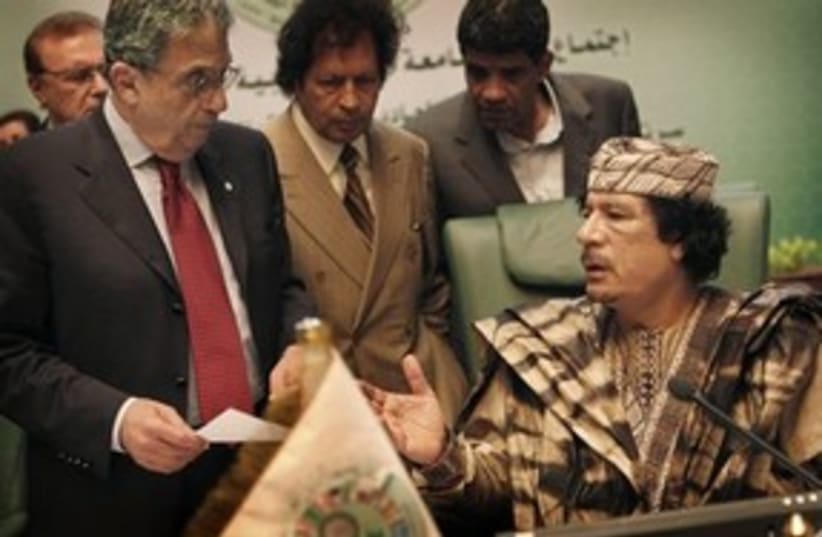UN Geneva, NY battle over flotilla probeMost of ‘Marmara’ wounded had Islamic ties – reportThe Moldova-flagged cargo ship Amalthea will leave no later than Saturday from the port of Lavrio, south of Athens, carrying 2,000 tons of food and medical supplies, officials from the organization told The Associated Press. There will be 27 people on board.Amalthea's journey to Gaza is expected to take up to 80 hours. Aid on the Amalthea included sacks of rice and sugar, and corn oil and olive paste mostly donated from Greek companies and charities, organizers said. The ship will also carry pro-Palestinian activists who are interested in breaking the blockade of Gaza."I am scared, but our lives are in God's hands," head volunteer Adburaufel Jaziri said. "Our job is to help anyone who needs it. We don't care if they are Catholics or Muslims or whatever. Now we are helping the people of Gaza who are suffering."Israel "can check our cargo and certificates, of course they are free to do this," Jaziri said. "If we cannot deliver the aid, we will let (Israel) deliver it."Chief of General Staff Lt.-Gen. Gabi Ashkenazi said Tuesday that the IDF had received information that preparations were under way for another flotilla from Libya, but that enthusiasm for a similar endeavor in Iran has significantly cooled.The navy’s May 31 boarding of the Mavi Marmara, he added, had a deterrent effect, and the Israeli decision to limit the scope of the naval blockade “increased the legitimacy of Israel’s actions and reduced the international legitimacy of future flotillas.”Ashkenazi noted that there were three possible scenarios regarding the participants in future flotillas: They could be international peace activists, pro-Palestinian activists planning to meet forces with violence and stiff opposition, or terrorists with suicidal intentions planning to meet IDF forces with bomb belts and automatic weapons.The chief of staff told MKs that in the case of the May flotilla, “we knew that there would be violence, but not intent to kill,” and that forensics experts were currently examining the origins of bullet casings found on the Mavi Marmara that did not come from any of the IDF-issued weapons used by the naval commandos.Ashkenazi said the IDF was conducting an internal probe into the events, in addition to the official inquiry being carried out by Maj.-Gen. (res.) Giora Eiland. Most of the conclusions, he said, pointed to the fact that the soldiers acted “bravely, professionally and proportionally.”Nevertheless, neither Israel nor any NATO allies have yet developed a way to stop ships at sea without causing damage to the ships themselves or to their passengers and crews, Ashkenazi noted.Associated Press contributed to this article.
Libyan ship to sail for Gaza
Organization headed by Gaddafi's son to send blockade busting vessel.

UN Geneva, NY battle over flotilla probeMost of ‘Marmara’ wounded had Islamic ties – reportThe Moldova-flagged cargo ship Amalthea will leave no later than Saturday from the port of Lavrio, south of Athens, carrying 2,000 tons of food and medical supplies, officials from the organization told The Associated Press. There will be 27 people on board.Amalthea's journey to Gaza is expected to take up to 80 hours. Aid on the Amalthea included sacks of rice and sugar, and corn oil and olive paste mostly donated from Greek companies and charities, organizers said. The ship will also carry pro-Palestinian activists who are interested in breaking the blockade of Gaza."I am scared, but our lives are in God's hands," head volunteer Adburaufel Jaziri said. "Our job is to help anyone who needs it. We don't care if they are Catholics or Muslims or whatever. Now we are helping the people of Gaza who are suffering."Israel "can check our cargo and certificates, of course they are free to do this," Jaziri said. "If we cannot deliver the aid, we will let (Israel) deliver it."Chief of General Staff Lt.-Gen. Gabi Ashkenazi said Tuesday that the IDF had received information that preparations were under way for another flotilla from Libya, but that enthusiasm for a similar endeavor in Iran has significantly cooled.The navy’s May 31 boarding of the Mavi Marmara, he added, had a deterrent effect, and the Israeli decision to limit the scope of the naval blockade “increased the legitimacy of Israel’s actions and reduced the international legitimacy of future flotillas.”Ashkenazi noted that there were three possible scenarios regarding the participants in future flotillas: They could be international peace activists, pro-Palestinian activists planning to meet forces with violence and stiff opposition, or terrorists with suicidal intentions planning to meet IDF forces with bomb belts and automatic weapons.The chief of staff told MKs that in the case of the May flotilla, “we knew that there would be violence, but not intent to kill,” and that forensics experts were currently examining the origins of bullet casings found on the Mavi Marmara that did not come from any of the IDF-issued weapons used by the naval commandos.Ashkenazi said the IDF was conducting an internal probe into the events, in addition to the official inquiry being carried out by Maj.-Gen. (res.) Giora Eiland. Most of the conclusions, he said, pointed to the fact that the soldiers acted “bravely, professionally and proportionally.”Nevertheless, neither Israel nor any NATO allies have yet developed a way to stop ships at sea without causing damage to the ships themselves or to their passengers and crews, Ashkenazi noted.Associated Press contributed to this article.